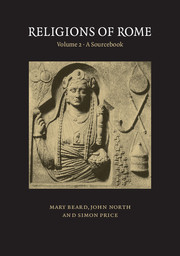Book contents
Summary
As Roman religion developed, religious pluralism became more important: individuals faced a wider range of religious choices, and increasingly joined groups which were specifically devoted to a particular god or goddess. These groups interacted with the civic cults and to an extent with each other. This chapter starts from the hostile reaction of the Roman senate to one of the earliest attested religious groups in the cult of Bacchus (12.1), and regulations that governed a very different kind of society - a burial ‘club’ under the patronage of Diana and Antinous (12.2). The bulk of the chapter concerns the group worship of a series of individual deities during the imperial period: Jupiter Dolichenus (12.3); Isis (12.4); Mithras (12.5); Jahveh (12.6); and the Christian god (12.7); documents relating to the cult of the Magna Mater are given elsewhere (2.7, 5.6 a-b, 6.7, 8.7). The focus of the selection is on the internal organization and social location of the cults, as well as their different cosmologies. We have drawn evidence from Rome where possible, though we have included some material from other places to illustrate regional spread and local differences.
See further: Vol. 1, 95-6, 215-16, 221-7, ch. 6 passim North (1992)*; for further translated texts see R C. Grant (1953) 116-23, M. Whittaker (1984) 229-68 and Meyer (1987).
The cult of Bacchus
The spread of the cult of Bacchus (in Greek, Dionysos) from southern Italy to Etruria and Rome triggered a violent reaction on the part of the Roman senate in 186 B.C. This is the earliest attested specifically religious group in the Roman world - though its exact nature is hard to understand, since the reports of its activities are uniformly hostile, stressing the immorality of the cult and its political threat to Rome.
See further: Vol. 1, 91-6, 98; Nilsson (1957); Henrichs (1978); North (1979)*; Pailler (1988).
Roman discovery of the cult of Bacchus (186B. C.)
Livy s account of the discovery of the Bacchic cult enlarges on the danger of its practices: magic, theft, immorality, fraud, even murder. These were common accusations against secret religious groups, being made later (for example) against the Christians (11.1 Id).
- Type
- Chapter
- Information
- Religions of Rome , pp. 288 - 348Publisher: Cambridge University PressPrint publication year: 1998

